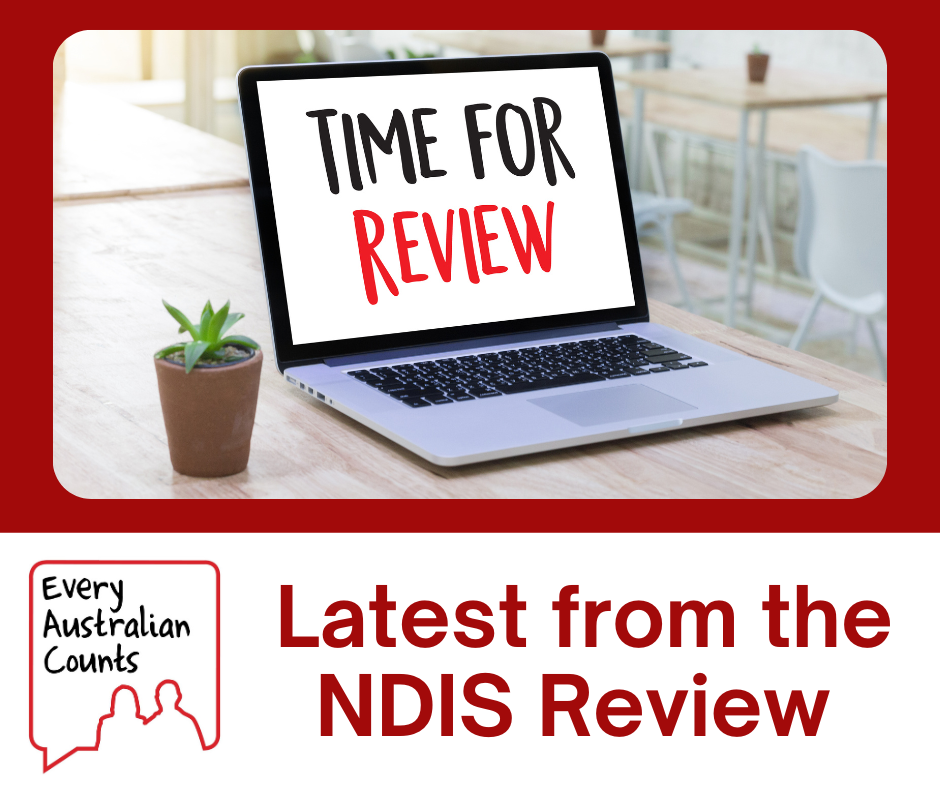The latest from the NDIS Review

Making mainstream supports accessible
The Panel believes we need to provide what they call ‘Community wide foundational supports’ alongside individual support. It would include information and peer support as well as support for adults with cognitive disability such as shopping, cooking and cleaning. Community wide foundational supports would also help children with emerging developmental concerns and delays.
Clarify eligibility and the definition of ‘reasonable and necessary supports’.
The Panel believes whether you are eligible for the NDIS should depend first on your level of functional impairment and need and only then on medical diagnosis.
Bonyhady says sustainability is fundamental to the human rights of people with disability and for this reason, the NDIA needs to have a clearer definition of ‘reasonable and necessary supports’. He wants to bring an end to line-by-line budgets. Instead, he is proposing a planning process that will include an assessment that will lead to a budget that will have fewer categories and less restrictions.
Planning process
The Panel wants to break the planning process into three stages:
- Information gathering – a personalised comprehensive meeting to talk about support needs
- Flexible and transparent individualised budget. Only funding for equipment, Supported Disability Accommodation and Supported Independent Living would be used for a prior purpose.
- Budget into action
They committed to making sure that the design and implementation work of these planning steps are done by NDIA together with participants, families, and members of the disability sector.
The 10 NDIS Review Reform areas
- Supports – Mainstream services such as health and education must become more inclusive and work closer with the NDIA.
- Improving participant experience -The NDIS needs to be more person-centred and consider intersectional needs of all First Nations people, people from Culturally and Linguistically Diverse (CALD) communities, people of all genders, and people with complex support needs.
- Access to the NDIS. – Access to the NDIS should be based on functional impairment’, not medical diagnoses.
- Definition of Reasonable and Necessary supports. – The NDIS needs a clear, and consistent definition of ‘Reasonable and Necessary’.
- Early Childhood – The support needs of children with developmental concerns and delays should be identified early in mainstream settings.
- Housing and Living. – This needs to be a consistent approach to people’s current and future housing needs.
- Intermediaries such as Local Area Coordinators (LACs), Case Coordinators and NDIS Planners – It needs to be made clearer whether these roles represent participants or the NDIS.
- NDIS Market – The NDIS Market is not delivering enough of the right supports in the right locations.
- Workforce – The NDIS needs a diverse, well-trained workforce.
- Quality and Safeguards – The NDIS needs an improved quality and safeguards framework. It needs to include foundational supports. There needs to be better information sharing between regulators.
Participants should be able to demand innovative and quality services.
Question and Answer
In the Question and Answer section of the meeting, the focus was on:
- Making sure all services work with all children and not just children already in the NDIS process.
- Making sure mainstream sectors such as health and education work with the NDIS so they are not silos.
- Making sure young people are given information about how to access supports when they leave school.
- Making sure young people are connected with people they trust and engaged in the community.
Key Message
The key message of the session was that every part of the NDIS – design, testing, implementation and evaluation should involve the people who use the system: participants, families and service providers.
Co-Chair of the NDIS Review Panel Lisa Paul said the NDIS should be “personalised, comprehensive, compassionate, expert and transparent”.
Stay Tuned
Every Australian Counts has a lot of questions about what is being proposed. Thank you for sending us your questions. Our Independent Chair, Dr George Taleporos, has been promised an interview this month with the co-chairs of the panel to get some answers. We look forward to bringing that to you very soon.

Join the conversation